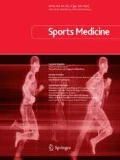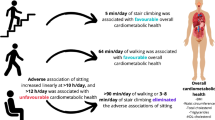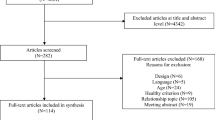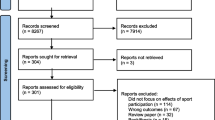Abstract
Because of the diversity in available questionnaires, it is not easy for researchers to decide which instrument is most suitable for his or her specific demands. Therefore, we systematically summarized and appraised studies examining measurement properties of self-administered and proxy-reported physical activity (PA) questionnaires in youth.
Literature was identified through searching electronic databases (PubMed, EMBASE using ‘EMBASE only’ and Sport Discus®) until May 2009. Studies were included if they reported on the measurement properties of self-administered and proxy-reported PA questionnaires in youth (mean age <18 years) and were published in the English language. Methodological quality and results of included studies was appraised using a standardized checklist (qualitative attributes and measurement properties of PA questionnaires [QAPAQ]).
We included 54 manuscripts examining 61 versions of questionnaires. None of the included questionnaires showed both acceptable reliability and validity. Only seven questionnaires received a positive rating for reliability. Reported validity varied, with correlations between PA questionnaires and accelerometers ranging from very low to high (previous day PA recall: correlation coefficient [r] = 0.77). In general, PA questionnaires for adolescents correlated better with accelerometer scores than did those for children.
From this systematic review, we conclude that no questionnaires were available with both acceptable reliability and validity. Considerably more high-quality research is required to examine the validity and reliability of promising PA questionnaires for youth.

















Similar content being viewed by others
References
Ekblom B, Astrand PO. Role of physical activity on health in children and adolescents. Acta Paediatr 2000; 89 (7): 762–4
Hallal PC, Victora CG, Azevedo MR, et al. Adolescent physical activity and health: a systematic review. Sports Med 2006; 36 (12): 1019–30
Ward DS, Evenson KR, Vaughn A, et al. Accelerometer use in physical activity: best practices and research recommendations. Med Sci Sports Exerc 2005; 37 (11 Suppl.): S582–8
Trost S. Measurement of physical activity in children and adolescents. Am J Lifestyle Med 2007; 1 (4): 299–314
Salmon J, Booth ML, Phongsavan P, et al. Promoting physical activity participation among children and adolescents. Epidemiol Rev 2007; 29: 144–59
Montoye HJ, Kemper HCG, Saris WHM, et al. Measuring physical activity and energy expenditure. Champaign (IL): Human Kinetics, 1996
Going SB, Levin S, Harrell J, et al. Physical activity assessment in American Indian schoolchildren in the Pathwaysstudy. Am J Clin Nutr 1999; 69 (4 Suppl.): 788–95S
Sallis JF. Self-report measures of children’s physical activity. J Sch Health 1991; 61 (5): 215–9
Baquet G, Stratton GVPEBS. Improving physical activity assessment in prepubertal children with high-frequencyaccelerometry monitoring: a methodological issue. Prev Med 2007; 44 (2): 143–7
Terwee CB, Mokkink LB, van Poppel MNM, et al. Qualitative attributes and measurement properties ofphysical activity questionnaires: a checklist. Sports Med 2010; 40 (7): 525–37
Scientific Advisory Committee of the Medical Outcomes Trust. Assessing health status and quality-of-life instruments: attributes and review criteria. Qual Life Res 2002; 11: 193–205
Terwee CB, Bot SD, de Boer MR, et al. Quality criteria were proposed for measurement properties of health statusquestionnaires. J Clin Epidemiol 2007; 60 (1): 34–42
de Vet HCW. Observer reliability and agreement. In: Armitage P, Colton T, editors. Encyclopedia of biostatistics. Boston (MA): John Wiley & Sons Ltd., 1998: 3123–8
Telford A, Salmon J, Jolley D, et al. Reliability and validity of physical activity questionnaires for children: the Children’sLeisure Activities Study Survey (CLASS). Pediatr Exerc Sci 2004; 16: 64–78
Janz KF, Broffitt B, Levy SM. Validation evidence for the Netherlands physical activity questionnaire for young children: the Iowa Bone Development study. Res Q Exerc Sport 2005; 76 (3): 363–9
Corder K, van Sluijs EM, Wright A, et al. Is it possible to assess free-living physical activity and energy expenditurein young people by self-report? Am J Clin Nutr 2009; 89 (3): 862–70
Crocker PR, Bailey DA, Faulkner RA, et al. Measuring general levels of physical activity: preliminary evidence forthe Physical Activity Questionnaire for Older Children. Med Sci Sports Exerc 1997; 29 (10): 1344–9
Treuth MS, Sherwood NE, Butte NF, et al. Validity and reliability of activity measures in African-American girlsfor GEMS. Med Sci Sports Exerc 2003; 35 (3): 532–9
Salmon J, Telford A, Crawford D. Assessment of physical activity among primary school aged children: the Children’sLeisure Activities Study (CLASS). Australas Epidemiolog 2002; 9: 10–14
Treuth MS, Sherwood NE, Baranowski T, et al. Physical activity self-report and accelerometry measures from theGirls Health Enrichment Multi-site Studies. Prev Med 2004; 38 Suppl.: x43–9
Ching PLYH, Dietz WH. Reliability and validity of activity measures in preadolescent girls. Ped Exerc Sci 1995; 7: 389–99
Brown TD, Holland BV. Test-retest reliability of the selfassessed physical activity checklist. Percept Mot Skills 2004; 99 (3 Pt 2): 1099–102
Koo MM, Rohan TE. Comparison of four habitual physical activity questionnaires in girls aged 7–15 yr. Med Sci Sports Exerc 1999; 31 (3): 421–7
Janz KF, Witt J, Mahoney LT. The stability of children’s physical activity as measured by accelerometry and selfreport. Med Sci Sports Exerc 1995; 27 (9): 1326–32
McMurray RG, Harrell JS, Bradley CB, et al. Comparison of a computerized physical activity recall with a triaxialmotion sensor in middle-school youth. Med Sci Sports Exerc 1998; 30 (8): 1238–45
Taren DL, Freeman MB, Brandenburg NA. Evaluation of dietary and activity questionnaires for elementary schoolchildren. Ann N Y Acad Sci 1993; 699: 298–300
Barbosa N, Sanchez CE, Vera JA, et al. A physical activity questionnaire: reproducibility and validity. J Sports Sci Med 2007; 6: 505–18
Lubans DR, Sylva K, Osborn Z. Convergent validity and test-retest reliability of the Oxford Physical Activity Questionnairefor secondary school students. Behav Change 2008; 25 (1): 23–34
Prochaska JJ, Sallis JF, Long B. A physical activity screening measure for use with adolescents in primary care. Arch Pediatr Adolesc Med 2001; 155 (5): 554–9
Rangul V, Holmen TL, Kurtze N, et al. Reliability and validity of two frequently used self-administered physicalactivity questionnaires in adolescents [abstract]. BMC Med Res Methodol 2008; 8: 47
Aaron DJ, Kriska AM, Dearwater SR, et al. Reproducibility and validity of an epidemiologic questionnaire toassess past year physical activity in adolescents. Am JEpidemiol 1995; 142 (2): 191–201
McMurray RG, Ring KB, Treuth MS, et al. Comparison of two approaches to structured physical activity surveys foradolescents. Med Sci Sports Exerc 2004; 36: 2135–43
Booth ML, Okely AD, Chey TN, et al. The reliability and validity of the Adolescent Physical Activity Recall Questionnaire. Med Sci Sports Exerc 2002; 34 (12): 1986–95
Treuth MS, Hou N, Young DR, et al. Validity and reliability of the Fels physical activity questionnaire for children. Med Sci Sports Exerc 2005; 37 (3): 488–95
Lachat CK, Verstraeten R, Khanh le NB, et al. Validity of two physical activity questionnaires (IPAQ and PAQA) for Vietnamese adolescents in rural and urban areas. IntJ Behav Nutr Phys Act 2008; 5: 37
Booth ML, Okely AD, Chey T, et al. The reliability and validity of the physical activity questions in the WHO health behaviour in school children (HBSC) survey: apopulation study. Br J Sports Med 2001; 35 (4): 263–7
Burdette HL, Whitaker RC, Daniels SR. Parental report of outdoor playtime as a measure of physical activity inpreschool-aged children. Arch Pediatr Adolesc Med 2004; 158 (4): 353–7
Nishikido N, Kashiwazaki H, Suzuki T. Preschool children’s daily activities: direct observation, pedometry orquestionnaire. J Hum Ergol (Tokyo) 1982; 11 (2): 214–8
Moore HJ, Ells LJ, McLure SA, et al. The development and evaluation of a novel computer program to assess previousdaydietary and physical activity behaviours in schoolchildren: the Synchronised Nutrition and Activity Program(SNAP). Br J Nutr 2008; 99 (6): 1266–74
Harro M. Validation of a questionnaire to assess physical activity of children ages 48 years. Res Q Exerc Sport 1997; 68 (4): 259–68
Tremblay MS, Inman JW, Willms JD. Preliminary evaluation of a video questionnaire to assess activity levels ofchildren. Med Sci Sports Exerc 2001; 33 (12): 2139–44
Ridley K, Olds TS, Hill A. The Multimedia Activity Recall for Children and Adolescents (MARCA): developmentand evaluation. Int J Behav Nutr Phys Act 2006; 3: 10
Kowalski KC, Crocker PR, Faulkner RA. Validation of the physical activity questionnaire for older children. Pediatr Exerc Sci 1997; 9 (2): 174–86
Janz KF, Medema-Johnson HC, Letuchy EM, et al. Subjective and objective measures of physical activity in relationshipto bone mineral content during late childhood:the Iowa Bone Development Study. Br J Sports Med 2008; 42 (8): 658–63
Sallis JF, Strikmiller PK, Harsha DW, et al. Validation of interviewer- and self-administered physical activity checklistsfor fifth grade students. Med Sci Sports Exerc 1996; 28 (7): 840–51
Basterfield L, Adamson AJ, Parkinson KN, et al. Surveillance of physical activity in the UK is flawed: validation ofthe Health Survey for England Physical Activity Questionnaire. Arch Dis Child 2008; 93 (12): 1054–8
Chen X, Sekine M, Hamanishi S, et al. Validation of a selfreported physical activity questionnaire for schoolchildren. J Epidemiol 2003; 13 (5): 278–87
Jurisson A, Jurimae T. The validity of the Godin-Shephard physical activity questionnaire in children. Biol Sport 1996; 13: 291–5
Moore JB, Hanes Jr JC, Barbeau P, et al. Validation of the Physical Activity Questionnaire for Older Children inchildren of different races. Pediatr Exerc Sci 2007; 19 (1): 6–19
Weston AT, Petosa R, Pate RR. Validation of an instrument for measurement of physical activity in youth. Med Sci Sports Exerc 1997; 29 (1): 138–43
Ekelund U, Neovius M, Linne Y, et al. The criterion validity of a last 7-day physical activity questionnaire (SAPAQ) foruse in adolescents with a wide variation in body fat: theStockholm Weight Development Study. Int J Obes (Lond) 2006; 30 (6): 1019–21
Wong SL, Leatherdale ST, Manske S. Reliability and validity of a school-based physical activity questionnaire. Med Sci Sports Exerc 2006; 38 (9): 1593–600
Janz KF, Lutuchy EM, Wenthe P, et al. Measuring activity in children and adolescents using self-report: PAQ-C andPAQ-A. Med Sci Sports Exerc 2008; 40 (4): 767–72
Kowalski KC, Crocker PR, Kowalski NP. Convergent validity of the physical activity questionnaire for adolescents. Pediatr Exerc Sci 1997; 9 (4): 342–52
Gao S, Schmitz K, Fulton J, et al. Reliability and validity of a brief tool to measure children’s physical activity. J Phys Act Health 2006; 3 (4): 415–22
Philippaerts RM, Matton L, Wijndaele K, et al. Validity of a physical activity computer questionnaire in 12- to 18-yearoldboys and girls. Int J Sports Med 2006; 27 (2): 131–6
Kimm SY, Glynn NW, Kriska AM, et al. Longitudinal changes in physical activity in a biracial cohort duringadolescence. Med Sci Sports Exerc 2000; 32 (8): 1445–54
Verheul ACM, Prins AN, Kemper HCG, et al. Validation of a weight-bearing physical activity questionnaire in a studyof bone density in girls and women. Pediatr Exerc Sci 1998; 10: 38–47
Hagstromer M, Bergman P, De BI, et al. Concurrent validity of a modified version of the International Physical Activity Questionnaire (IPAQ-A) in European adolescents: the HELENA study. Int J Obes (Lond) 2008; 32 Suppl.5: S42–8
Shiely F, MacDonncha C. Meeting the international adolescent physical activity guidelines: a comparison of objectivelymeasured and self-reported physical activitylevels. Ir Med J 2009; 102 (1): 15–9
Biddle SJ, Mitchell J, Armstrong N. The assessment of physical activity in children: a comparison of continuousheart rate monitoring, self-report, and interview recalltechniques. Br J Phys Educ 1991 (Research Suppl.): 5–8
Narring F, Cauderay M, Cavadini C, et al. Physical fitness and sport activity of children and adolescents: methodologicalaspects of a regional survey. Soz Praventivmed 1999; 44 (2): 44–54
Schmidt GJ, Walkuski JJ, Stensel DJ. The Singapore Youth Coronary Risk and Physical Activity Study. Med Sci Sports Exerc 1998; 30 (1): 105–13
Guyatt GH, Deyo RA, Charlson M, et al. Responsiveness and validity in health status measurement: a clarification. J Clin Epidemiol 1989; 42 (5): 403–8
Sallis JF, Saelens BE. Assessment of physical activity by selfreport: status, limitations, and future directions. Res QExerc Sport 2000; 71 (2): S1–14
Oliver M, Schofield GM, Kolt GS. Physical activity in preschoolers: understanding prevalence and measurement issues. Sports Med 2007; 37 (12): 1045–70
Sirard JR, Pate RR. Physical activity assessment in children and adolescents. Sports Med 2001; 31 (6): 439–54
Freedson PS, Miller K. Objective monitoring of physical activity using motion sensors and heart rate. Res Q Exerc Sport 2000; 71 (2 Suppl.): S21–9
Bassett Jr DR, Ainsworth BE, Swartz AM, et al. Validity of four motion sensors in measuring moderate intensity physicalactivity. Med Sci Sports Exerc 2000; 32 (9 Suppl.): S471–80
Melanson Jr EL, Freedson PS. Validity of the Computer Science and Applications, Inc. (CSA) activity monitor. Med Sci Sports Exerc 1995; 27 (6): 934–40
Slootmaker SM, Chin A Paw, Schuit AJ, et al. Concurrent validity of the PAM accelerometer relative to theMTI Actigraph using oxygen consumption as a reference. Scand J Med Sci Sports 2009; 19 (1): 36–43
Ekelund U, Sjostrom M, Yngve A, et al. Physical activity assessed by activity monitor and doubly labeled water inchildren. Med Sci Sports Exerc 2001; 33 (2): 275–81
Hendelman D, Miller K, Baggett C, et al. Validity of accelerometry for the assessment of moderate intensity physicalactivity in the field. Med Sci Sports Exerc 2000; 32 (9 Suppl.): S442–9
Welk GJ, Blair SN, Wood K, et al. A comparative evaluation of three accelerometry-based physical activity monitors. Med Sci Sports Exerc 2000; 32 (9 Suppl.): S489–97
Corder K, Ekelund U, Steele RM, et al. Assessment of physical activity in youth. J Appl Physiol 2008; 105 (3): 977–87
Hesketh K, Crawford D, Salmon J. Children’s television viewing and objectively measured physical activity: associations with family circumstance. Int J Behav Nutr Phys Act 2006; 3: 36
Mattocks C, Ness A, Leary S, et al. Use of accelerometers in a large field-based study of children: protocols, designissues, and effects on precision. J Phys Act Health 2008; 5 Suppl. 1: S98–111
Bailey RC, Olson J, Pepper SL, et al. The level and tempo of children’s physical activities: an observational study. Med Sci Sports Exerc 1995; 27 (7): 1033–41
Tang RB, Lee PC, Chen SJ, et al. Cardiopulmonary response in obese children using treadmill exercise testing. Zhonghua Yi Xue Za Zhi (Taipei) 2002; 65 (2): 79–82
Tudor-Locke C, Williams JE, Reis JP, et al. Utility of pedometers for assessing physical activity: construct validity. Sports Med 2004; 34 (5): 281–91
Tudor-Locke C, Williams JE, Reis JP, et al. Utility of pedometers for assessing physical activity: convergent validity. Sports Med 2002; 32 (12): 795–808
Raudsepp L, Jurimae T. Relationships between somatic variables, physical activity, fitness and fundamental motorskills in prepubertal boys. Biol Sport 1996; 13 (4): 279–89
Hands B, Larkin D, Parker H, et al. The relationship among physical activity, motor competence and health-relatedfitness in 14-year-old adolescents. Scand J Med Sci Sports 2009; 19 (5): 655–63
Acknowledgements
This review was financially supported by the Department of Public and Occupational Health, the Department of Epidemiology and Biostatistics, the EMGO Institute for Health and Care Research, VU University Medical Center and Body@Work, Research Center Physical Activity, Work and Health, TNO-VU University Medical Center, Amsterdam, the Netherlands. The authors have no conflicts of interest directly relevant to the contents of this article.
Author information
Authors and Affiliations
Corresponding author
Rights and permissions
About this article
Cite this article
Chinapaw, M.J.M., Mokkink, L.B., van Poppel, M.N.M. et al. Physical Activity Questionnaires for Youth. Sports Med 40, 539–563 (2010). https://doi.org/10.2165/11530770-000000000-00000
Published:
Issue Date:
DOI: https://doi.org/10.2165/11530770-000000000-00000




